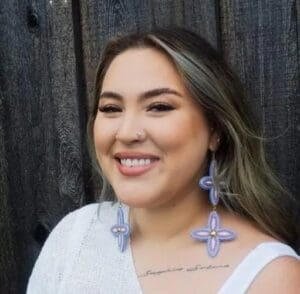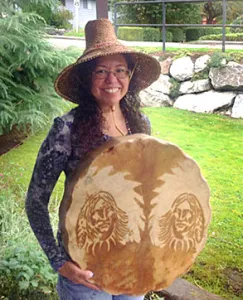Learning Lushootseed in an Environment of Intergenerational Trauma (aired August 2023)
Teaching Lushootseed to Toddlers
Lushootseed is the language spoken by Coast Salish tribes in the greater Seattle area and north to Skagit River Valley near Bellingham and Whidbey Island, and south to Olympia and Shelton. In 1819, Congress passed the Civilization Fund Act to assimilate indigenous youth to western culture. The policy authorized forcible separation of indigenous children from their families to be sent to boarding schools far away, where they were to be stripped of their language, culture and religious practices. It wasn’t until the 1970’s that this practice was outlawed. This caused a severe disruption in likelihood for traditional practices and lifestyles to continue.
Today, members of these communities are reawakening their native tongue through education to everyone from 6 month olds, elementary and high school students and adults.
Jasmyne Diaz is an enrolled Tulalip member and shares a peek into her work of teaching Lushootseed language as a Teacher Assistant to six-month to two-year old children in Tulalip, Washington through the Tulalip Lushootseed Language Program
Producers: Laura Florez and Yuko Kodama
Incorporating Lushootseed Language Into Life
Reawakening Lushootseed Language: Language Warriors
Lushootseed is the language spoken by Coast Salish tribes in the greater Seattle region. In 1819, Congress passed the Civilization Fund Act to assimilate indigenous youth to western culture. The policy authorized forcible separation of indigenous children from their families to be sent to boarding schools, where they were to be stripped of their language, culture and religious practices. It wasn’t until the 1970’s that this practice was outlawed. Today, members of these communities are reawakening their native language through educational programs.
KBCS’s Laura Florez spoke with Lois Landgrebe, of Snohomish, Stillaguamish, Duwamish and Nez Perce descendants, and a Lushootseed educator at Quil Ceda Tulalip elementary school in Tulalip, Washington through the Tulalip Lushootseed Program. Landgrebe describes what it means to be a language warrior.
Producers: Laura Florez, Yukiko Arichi and Yuko Kodama
Taking the Racism Out of Teaching English Writing
KBCS highlights a progressive approach to teaching college writing classes. A method of teaching college level writing titled Anti-racist Writing Assessment Ecology was adopted by 62 faculty at 30 out of the 34 Washington community college and technical colleges (at the time we were working on this story). The methodology is meant to address and minimize what some educators are considering a culturally colonized education environment.
Dr. Asao Inoue is a Professor of Rhetoric and Composition in the College of Integrative Sciences and Arts at Arizona State University. He developed the Anti-racist Writing Assessment Ecology and wrote the book, Writing Assessment, Social Justice, and The Advancement of Opportunity. Dr. Inoue talked about the approach and what inspired him to create it.





